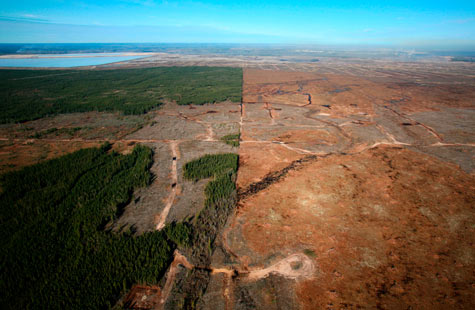
"Alberta's tar sands are arguably the world's most destructive energy project in progress today. Being Canada's main economic driver, and a favourite source of 'safe' energy for its big neighbour down south, the tar sands are a hotly contested issue between the provincial and national government, environmental groups and the indigenous people of Canada who by and large are opposed to the breakneck speed of oil industry developments.
Stretching from the town of Fort McMurray northwards and as far as Peace River to the west, the confirmed deposits of bitumen in the ground take up an area the size of England. To date, only three to five per cent of the existing deposits are being mined or extracted, by inserting high-pressure steam into the ground. Turning bitumen into synthetic crude oil is no easy task: it requires vast amounts of energy and water, and the yields have only become viable with an exploding per-barrel oil price. For thousands of years, Alberta's prime resource has lain idle in the ground, oil companies patiently awaiting their turn until prices went rocketing in the last decade. The once sleepy town of Fort McMurray has been turned into the new frontier of the latest gold rush, absorbing the gains and ills that come with it: rapid growth, high prices, a huge influx of workers, crime, drugs and pollution. Walking down the bland main drag of the aptly nicknamed 'Fort McMoney', you can't help but notice that anybody who is anybody in the oil business has set up camp here: Shell, Total, Chevron, Syncrude, Suncor, CNRL, BP, Husky, Statoil and numerous others have bought up leases to extract the black gold from Alberta's land.
This comes at a high cost, both in terms of investment and natural resources as well as to the environment and the people who live there: the divisive issue is one of land rights and health concerns of Canada's First Nations who live downstream from the tar sands. Is Canada to respect aboriginal land rights, as enshrined in their treaty with the Crown over a hundred years ago which grants the First Nations the freedom to hunt, fish and trap according to their ancient ways? Or is it more interested in oil developments with their consequential destruction of the boreal forest, bringing of employment, and ultimately, money?
For many years, the First Nations in northern Alberta have been complaining about grave health concerns and unusually high cancer rates in their communities - a concern apparently not shared by the Province of Alberta. On another level, several First Nations have begun to legally challenge the status quo and the sale of their lands to oil companies. It is a fight that is synonymous of the classic David vs. Goliath: small and mostly poor communities on the one side; big oil, government, and heavyweight lawyers on the other.
One thing is for sure: the future is set to be challenging, and a mighty struggle is looming."
- Jiri Rezac, July 2010
